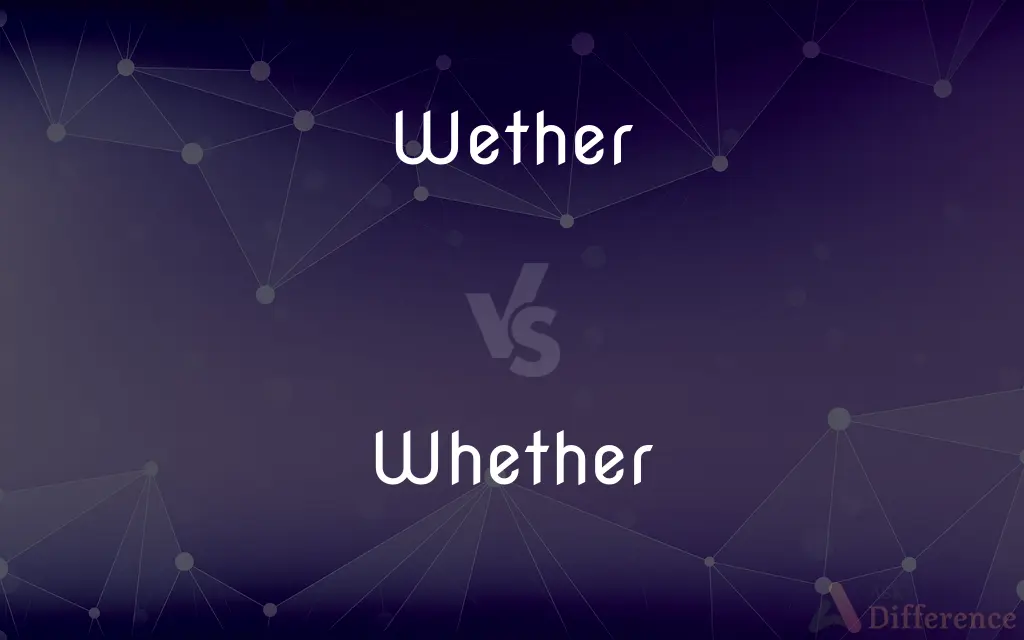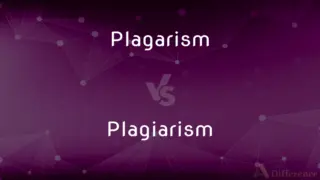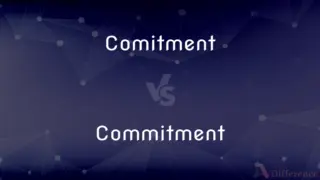Wether vs. Whether — Which is Correct Spelling?
Edited by Tayyaba Rehman — By Fiza Rafique — Updated on April 3, 2024
"Wether" is incorrect for expressing uncertainty; "whether" is the right spelling, denoting if something is the case or not.

Table of Contents
Which is correct: Wether or Whether
How to spell Whether?

Wether
Incorrect Spelling

Whether
Correct Spelling
ADVERTISEMENT
Key Differences
"Whether" starts like "what," both of which ask questions.
Remind yourself that "wether" is a sheep and unrelated to decision-making.
"Weather" relates to the climate, "whether" is about choices, and "wether" is a castrated sheep. Only "whether" relates to decisions or alternatives.
Think of the phrase "whether or not" to remember the correct spelling.
Associate "whether" with decision-making situations in your mind.
ADVERTISEMENT
How Do You Spell Whether Correctly?
Incorrect: She couldn't decide wether to buy the red dress or the blue one.
Correct: She couldn't decide whether to buy the red dress or the blue one.
Incorrect: I'm not sure wether I should go to the party or not.
Correct: I'm not sure whether I should go to the party or not.
Incorrect: The team couldn't agree on wether to proceed with the plan.
Correct: The team couldn't agree on whether to proceed with the plan.
Incorrect: We were discussing wether it would rain tomorrow.
Correct: We were discussing whether it would rain tomorrow.
Incorrect: He wondered wether she would accept his invitation.
Correct: He wondered whether she would accept his invitation.
Whether Definitions
Indicating doubt or a choice between alternatives.
She can't decide whether to go or stay.
Introducing a question or indirect question.
He asked whether I had any plans.
Used to test or confirm something.
See whether she's free on Friday.
Used in indirect questions to introduce one alternative
We should find out whether the museum is open. See Usage Notes at doubt, if.
Used to introduce alternative possibilities
Whether she wins or whether she loses, this is her last tournament.
Either
He passed the test, whether by skill or luck.
(obsolete) Which of two.
(obsolete) Introduces a direct question between alternatives (often with correlative or).
Indicates doubt between possibilities (usually with correlative or).
He chose the correct answer, but whether by luck or by skill I don't know.
Without a correlative, introduces a simple indirect question.
Do you know whether he's coming?
Introduces a disjunctive adverbial clause qualifying the main clause (with correlative or).
He's coming, whether you like it or not.
Whether or not you're successful, you can be sure you did your best.
Which (of two); which one (of two); - used interrogatively and relatively.
Now choose yourself whether that you liketh.
One day in doubt I cast for to compareWhether in beauties' glory did exceed.
Whether of them twain did the will of his father?
In case; if; - used to introduce the first or two or more alternative clauses, the other or others being connected by or, or by or whether. When the second of two alternatives is the simple negative of the first it is sometimes only indicated by the particle not or no after the correlative, and sometimes it is omitted entirely as being distinctly implied in the whether of the first.
And now who knowsBut you, Lorenzo, whether I am yours?
You have said; but whether wisely or no, let the forest judge.
For whether we live, we live unto the Lord; and whether we die, we die unto the Lord; whether we live therefore, or die, we are the Lord's.
But whether thus these things, or whether not;Whether the sun, predominant in heaven,Rise on the earth, or earth rise on the sun, . . . Solicit not thy thoughts with matters hid.
Used to introduce alternatives or possibilities.
I'm unsure whether I'll attend the party.
Expressing a doubt or choice between two options.
We’re deciding whether to travel now or later.
Whether Meaning in a Sentence
She asked whether anyone had seen her missing dog.
We're not sure whether the event will be held outdoors due to the weather.
I can't decide whether to have pizza or pasta for dinner.
He was considering whether to apply for the job.
She couldn't remember whether she had locked the door.
Whether you like it or not, you need to finish your homework.
They need to determine whether the project is feasible.
The teacher will check whether all students have submitted their projects.
I wonder whether the museum is open on Mondays.
He's unsure whether to sell his car.
It's important to know whether the information is accurate.
She's deciding whether to study abroad next semester.
The discussion was about whether technology benefits education.
They were debating whether to go on vacation or save the money.
I'm curious whether the book is as good as the movie.
It's unclear whether the meeting will be in person or virtual.
He asked whether she would like to have coffee.
The company is reviewing whether to expand into new markets.
We'll see whether the changes have made an improvement.
The report will indicate whether further action is needed.
She's thinking about whether to start her own business.
They were unsure whether to believe the rumors.
Whether he wins or loses, he's done his best.
Whether to hire more staff is a major decision for the business.
They're checking whether the package has been shipped.
Whether Idioms & Phrases
Whether by sea or by air
Regardless of the method of travel.
We will get the supplies to you, whether by sea or by air.
Whether or not
Used to say that something is true in either case.
I'm going to the beach tomorrow, whether or not it rains.
No matter whether
It does not matter what the circumstances are.
She promised to support him, no matter whether he succeeded or failed.
Whether you like it or not
Used to say that something will happen or is true despite someone's opinion.
You're going to the dentist, whether you like it or not.
Common Curiosities
What is the verb form of whether?
"Whether" is not a verb and does not have verb forms.
What is the root word of whether?
The word "whether" comes from Old English "hwæther."
Why is it called whether?
The term "whether" originates from Old English and is used to introduce alternatives.
What is the plural form of whether?
"Whether" does not have a plural form.
Which vowel is used before whether?
No specific vowel precedes "whether" consistently; it depends on the context.
Which preposition is used with whether?
"Or" as in "whether or not."
Which conjunction is used with whether?
"Or" as in "whether...or."
What is the pronunciation of whether?
/ˈwɛð.ər/
What is the singular form of whether?
"Whether" itself is singular.
How do we divide whether into syllables?
wheth-er.
Which determiner is used with whether?
Determiners are not typically used directly with "whether."
Is whether a negative or positive word?
It is neutral.
Is the whether term a metaphor?
No.
What is the opposite of whether?
There's no direct opposite for "whether."
Is whether a countable noun?
"Whether" is not a noun.
Is the word whether imperative?
No.
What is the first form of whether?
"Whether" does not have verb forms.
What is the third form of whether?
"Whether" does not have verb forms.
How is whether used in a sentence?
"I can't decide whether to buy the red dress or the blue one."
Is whether an adverb?
No.
Is whether an abstract noun?
No.
Is whether a vowel or consonant?
"Whether" is a word containing both vowels and consonants.
What is a stressed syllable in whether?
"wheth."
What part of speech is whether?
Conjunction.
What is another term for whether?
If.
Which article is used with whether?
It can be preceded by any article depending on the sentence, but often no article is used.
Is whether a noun or adjective?
Neither. "Whether" is a conjunction.
Is whether a collective noun?
No.
How many syllables are in whether?
Two.
What is the second form of whether?
"Whether" does not have verb forms.
Share Your Discovery

Previous Comparison
Plagarism vs. Plagiarism
Next Comparison
Comitment vs. CommitmentAuthor Spotlight
Written by
Fiza RafiqueFiza Rafique is a skilled content writer at AskDifference.com, where she meticulously refines and enhances written pieces. Drawing from her vast editorial expertise, Fiza ensures clarity, accuracy, and precision in every article. Passionate about language, she continually seeks to elevate the quality of content for readers worldwide.
Edited by
Tayyaba RehmanTayyaba Rehman is a distinguished writer, currently serving as a primary contributor to askdifference.com. As a researcher in semantics and etymology, Tayyaba's passion for the complexity of languages and their distinctions has found a perfect home on the platform. Tayyaba delves into the intricacies of language, distinguishing between commonly confused words and phrases, thereby providing clarity for readers worldwide.


































